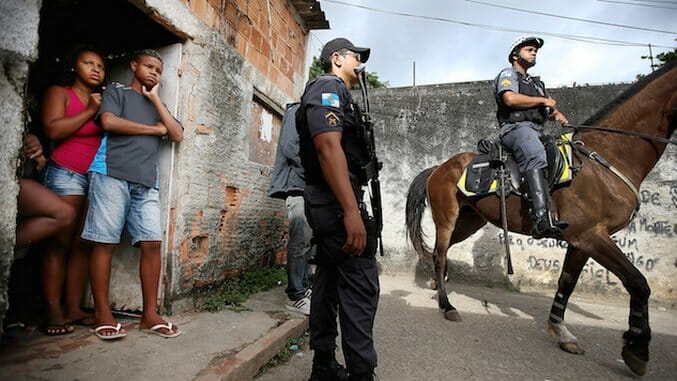Human Rights Groups Highlight Killings By Police Ahead of Rio Olympics
Photos by Mario Tama/Getty Images Olympics Features
Jonathan de Oliveira Lima had just dropped off a dessert at his grandmother’s home when he was shot in the back and killed by military police. It was less than four weeks before the World Cup began in Brazil in June 2014, and security in Manguinhos, a favela in Rio de Janeiro’s north zone the 19-year-old called home, had tightened considerably. He was one of 580 civilians killed by police in Rio in 2014—a 40 percent increase from the previous year.
Last week, Jonathan’s mother, Ana Paula Oliveira, met with International Olympic Committee officials in Switzerland to implore the organization to monitor human rights abuses in Rio during the upcoming Olympic Games. She fears the expanded security presence in the city will contribute to more police-involved killings in a city with few legal recourses for low-income residents.
Her concerns were reflected in a new report by Amnesty International condemning the forced evictions, police violence and restrictions of civil liberties pervasive in Rio as the city has readied itself for the Olympics. The report claims the city’s previous experiences hosting mega-events and its history of police violence indicate that the upcoming Games could lead to an increase in human rights abuses, particularly among low-income residents of Rio’s 1000 favelas.
Police-involved shootings are notoriously underreported in Brazil, but recent research indicates a particularly dire situation in Rio. Human Rights Watch reports that 645 people were killed by police in 2015, accounting one fifth of homicides in the city. The study also found that police frequently alter crime scenes, planting guns or removing bodies entirely. The Rio-based Instituto de Segurança Pública (ISP) reported last month that 40 people were killed by police in the month in May, a 135 percent increase compared with the 17 police-involved killings in May 2015. The uptick prompted the United Nations to issue an official statement of concern regarding police-inflicted violence.
“The soaring death count ahead of this major sporting event represents an epic failure on the part of the authorities to protect the most fundamental human right—the right to life,” said Atila Roque, Executive Director of Amnesty International Brazil.
Security preparations currently present one of the most pressing challenges ahead of the Olympics. Authorities have promised to deploy 85,000 armed soldiers and police officers to guard stadiums, athletic facilities and popular tourist districts in what will be the largest security operation in Brazilian history. These forces do not include the thousands of military police officers currently occupying Rio favelas through the city’s “pacification” program.
Yet police are publicly decrying poor working conditions and the increasing violence plaguing the city. Homicides have increased by 15 percent while street robberies have increased by 30 percent compared with last year. Traffickers and police are currently engaged in armed conflicts in 20 favelas. This year alone, according to police, 54 Rio officers have been killed. The State’s economic crisis has only exacerbated the situation. Shortly after the governor declared a state of financial emergency, the Federal government issued a loan of R$2.9 billion ($895 million USD) to cover the part of the cost of Olympic security. Many worry that security in Rio could further deteriorate following the Games given these funding shortages.
For the time being, favela residents and human rights activists argue the surge in police forces have already had a disproportionately negative effect on low-income residents in Rio. According to Human Rights Watch, three quarters of those killed by police in 2015 were young black men from favelas, leading residents to rally against systemic racism in policing practices. Some have described the situation as a genocide against black youth. Before the spikes in police-involved homicides in recent years, the Brazilian Bar Association of Rio de Janeiro concluded that over 10,000 civilians were killed by police between 2001-2011. Things have only gotten worse since then.
Several community organizations have taken measures to combat police brutality in favelas. Two smartphone applications intended to capture and protect cellphone footage and photos of police misconduct have been launched in the last four months in reaction to the rising tide of violence. One of the services, DefeZap (Defe serving as a shorthand for “defense” and Zap referring to WhatsApp) was developed by the NGO MeuRio and allows residents to anonymously submit evidence to a protected WhatsApp number.
The app Nós Por Nós (“We For Us”) was developed by the Youth Forum of Rio de Janeiro with support from the Public Defender’s Office. In the first two weeks of operation alone, over 40 reports of police violence had been submitted, including homicide, sexual assault, torture and an unjust home invasion.
Cosme Felippsen, a representative on the Youth Forum and resident of Providência, emphasized the importance of encouraging residents to report not just physical violence, such as torture and violence, but also instances of homophobia and sexual assault, which are also traumatizing but underreported.
“The Olympics are supposed to be bringing security to the city—but this is a façade. The same military police officers that currently occupy favelas are supposed to keep us safe and yet we know they are corrupt, racist and violent. The Olympics will bring more officers but nothing will improve here,” he said.

Demonstrators rally against the genocide of black youth in Rio de Janeiro. December 2015. Source: Meg Healy

Source: Anistia Internacional Brasil